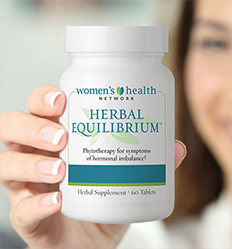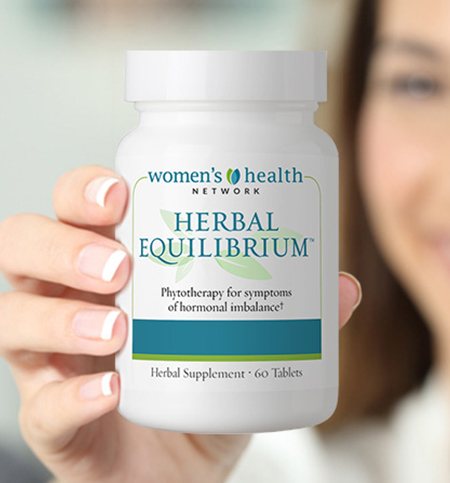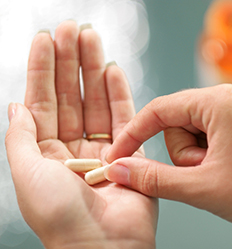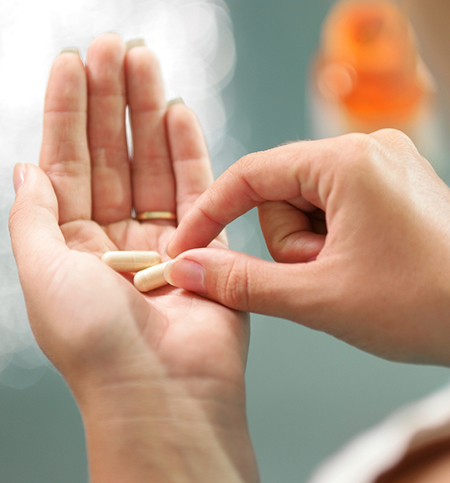Reviewed by Dr. Amber Hayden, DO
How often have you had to cancel big plans because you were suffering from PMS? Not only does premenstrual syndrome impact your life, but there’s also a certain stigma attached to it, as if it isn’t really a legitimate reason to stay home from work or alter your schedule.

Yet for many women with PMS, the irritability, cravings, cramps, headaches, moodiness, anxiety and more can be debilitating, and even life-changing.
Table of contents
So what can you do?
At Women’s Health Network, we know that if you have PMS, you’re looking both for solutions that really work and that address the imbalances in your body head-on. But if you’ve tried antidepressants, birth control pills and products on the shelf at the drug store, such as Midol, Motrin and Aleve, you haven’t been targeting the root cause of your PMS. These options may work for the short-term, but they won’t, and can’t, stop your symptoms from returning again next month.
We’ve got good news for you: Mother Nature has some natural ways to relieve and even prevent premenstrual syndrome so you can keep doing the things you love — without monthly interruptions.
Common symptoms of PMS
- Irritability and angry outbursts
- Bloating
- Breast tenderness
- Cramps
- Sleep disturbances
- Blood sugar shifts
- Cravings
- Headaches
- Loss of sexual desire
- Anxiety and moodiness
The root causes of PMS
It’s true that your hormones are the primary reason for PMS symptoms, but you may not have realized these include more than estrogen and progesterone. Our endocrine (hormone) system has its hub in the brain. The hypothalamus and pituitary glands work together in the brain to send messages to the rest of the body about hormone release. This includes signaling the release of progesterone and estrogen, adrenal hormones (such as cortisol), insulin and more. So it makes sense that when one hormonal loop is off track, others can be affected.
For example, high stress levels can lead to high cortisol, which can throw off progesterone levels and/or insulin regulation, leading to irritability, anxiety and cravings.
Primary root causes of PMS
- High estrogen-to-progesterone ratio
- Abnormal neurotransmitter response (in the brain)
- Disrupted salt metabolism (causing bloating)
- Stress (causing high cortisol)
- Carbohydrate metabolism
- Nutritional deficiencies
The sooner you can understand the root cause for your PMS, the faster you can uncover the underlying issue and resolve it. Sadly, common medical treatment is set up to treat only symptoms rather than root causes. But the wonderful advantage to using herbs, vitamins and minerals — all from nature — is that we can quell symptoms and re-balance the body, which allows us to feel better and get to the root of the issue.

Nature’s PMS solutions
When we say Mother Nature has real solutions for PMS, we mean it! There are plenty of natural offerings to help smooth out the bumpy road PMS often presents. Take a look at how each of the following ingredients can help specific PMS symptoms.
The herbs listed below are known as “adaptogenic,” meaning they communicate with the cells in your body to give you the precise amount to bring your body back into its ideal balance. This is much better than pharmaceutical and over-the-counter medications that sometimes can overwhelm your system.
Chasteberry (Vitex agnus-castus). Chasteberry contains compounds that have been shown to affect receptors for estrogen and dopamine (one of our feel-good neurotransmitters). It can help with menstrual cycle irregularity, cramps, bloating and breast tenderness.
Dong quai (Angelica sinensis). Originally used in China, dong quai was introduced to Western medicine in 1899 for treating menstrual disorders. It has been shown to help relieve cramps and other PMS symptoms such as headache, insomnia and moodiness. It is thought to be more effective in combination with black cohosh.
Maca (Lepidium meyenii). Traditionally maca was used by native Peruvians to enhance fertility. But more recent studies have shown that it can help with stress, anxiety, mood and low sex drive — all symptoms common with PMS.
Black cohosh (Cimicifuga racemosa). Though widely used for menopause symptoms, black cohosh is also an excellent herb for PMS, especially when it comes to irritability and sleep disturbances.
Lemon balm (Melissa officinalis). Lemon balm is known for its calming properties and can help with PMS-related anxiety and insomnia.
Wild yam (Dioscorea villosa). Wild yam was traditionally used for intestinal problems as well as labor pains and menstrual issues. There is debate about whether wild yam can act as a precursor to sex hormones like estrogen and progesterone, but we’ve found it helpful for our patients who have high estrogen levels.
Burdock. In addition to its anti-inflammatory effect, burdock is a powerful diuretic, so it can help reduce excess fluid and bloating associated with PMS.
St. John’s wort. St. John’s wort can be useful for mild depression and the moodiness that sometimes accompanies PMS. But beware that it can interfere with birth control pills in some women, so be sure to discuss your plan with your doctor.
Ginkgo (Ginkgo biloba). Primarily known for its benefit to memory, ginkgo has also proven helpful for PMS symptoms, particularly when it comes to fluid retention and breast tenderness.
Chromium. Chromium is a mineral that has been shown to help regulate insulin and blood sugar. This regulation can prevent cravings and support appetite regulation.
Calcium, magnesium and Vitamin B6. This power combination can do wonders for PMS. All have been researched extensively and offer positive effects on pain, mood and general PMS symptoms. Magnesium is especially good to take if you have chocolate cravings!
In our experience, herbs, vitamins and minerals, along with a healthy diet and regular exercise make up the best and most effective PMS protocol. We’ve found conclusively that many adaptogenic herbs work best in combination formulas.
We take PMS seriously
Though it sometimes seems like the rest of the world doesn’t take premenstrual syndrome seriously, we know better than most that PMS symptoms can have a significant impact on your life. If you’re ready to try an approach that is totally safe, natural and that gets at the root of the issue, herbs, vitamins and minerals offer a surprisingly satisfying and effective solution.














